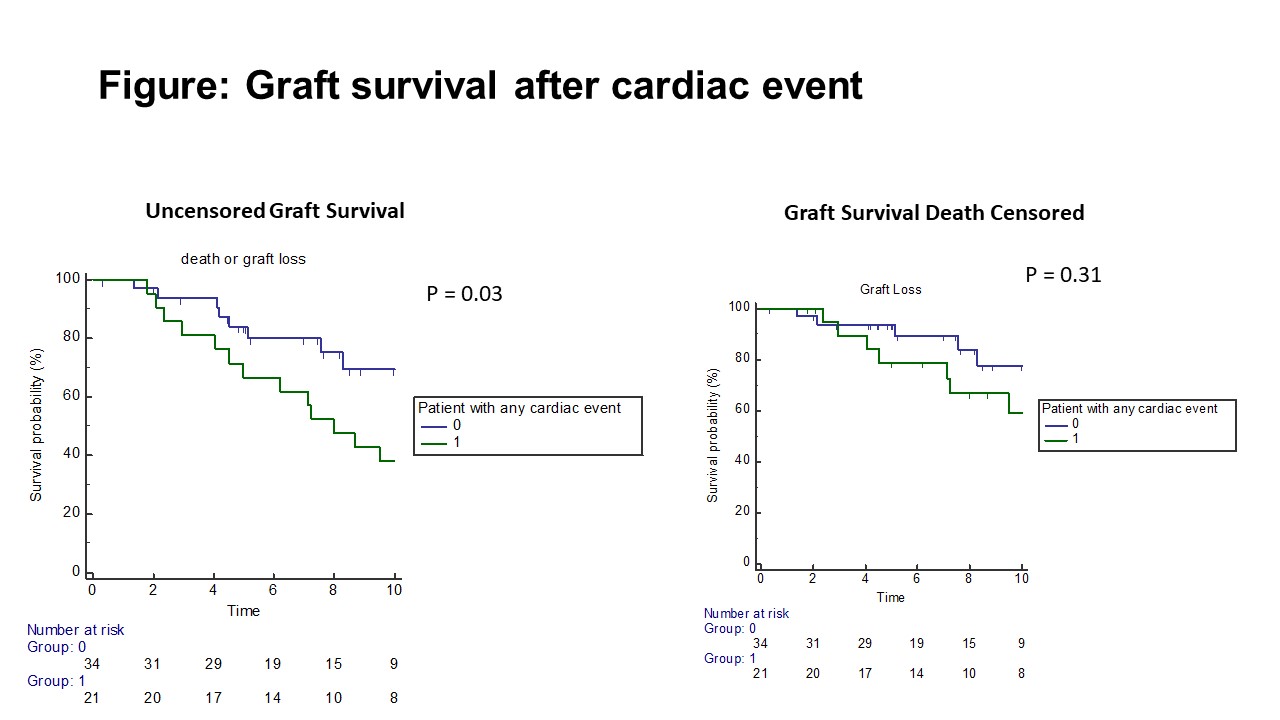Normal Coronary Angiogram Pre-Transplant Does Not Predict Cardiac Events in Diabetic Kidney Transplant Recipients
F. Aziz, A. Mulay, M. Anders, S. Parajuli, D. Mandelbrot, A. Djamali
University of Wisconsin, Madison, WI
Meeting: 2019 American Transplant Congress
Abstract number: C181
Keywords: Graft survival, Kidney transplantation, Metabolic complications
Session Information
Session Name: Poster Session C: Kidney: Cardiovascular and Metabolic
Session Type: Poster Session
Date: Monday, June 3, 2019
Session Time: 6:00pm-7:00pm
 Presentation Time: 6:00pm-7:00pm
Presentation Time: 6:00pm-7:00pm
Location: Hall C & D
*Purpose: Cardiac events (CE) are a common cause of death in kidney transplant recipients. The aim of this study was to determine the risk factors associated with CE in kidney transplant recipients with normal cardiac catheterization prior to transplantation.
*Methods: We analyzed the incidence of CE (ischemic, heart failure, and arrhythmic heart disease) in all kidney transplant recipients between 01/2000-12/2016 who had normal cardiac catheterization findings at their pre-transplant evaluation.
*Results: Among 241 patients with pre-transplant cardiac catheterization, 55 patients (22.8%) had normal cardiac catheterization findings. These patients were divided into two groups based on the incidence of CE post-transplant: CE negative (CE–, n=34), and CE positive (CE+, n=21). The mean follow-up for CE– and CE+ groups was 7.6±4.4 and 10±7 years, respectively (p=0.1). Heart failure (n = 11) was the most common CE, followed by ischemic heart disease (n = 6, and arrhythmia (n= 4). Baseline characteristics were similar between the two groups, expect for a higher prevalence of diabetes and tacrolimus use as maintenance therapy in the CE+ group (p=0.0001 and p=0.003, respectively). Cox regression univariate analysis determined diabetes (HR=14.4, 95% Cl 1.10 to 10.17, p=0.04) and tacrolimus use (HR=3.7, 95% Cl 1.30 to 10.45, p=0.01) as significant predictors of CE post-transplant. However, multivariable analysis only retained diabetes (HR=10.85, 95% Cl 1.18 to 74.97, p=0.03). Notably, any CE post-transplant was associated with a significant risk of death or graft loss (p = 0.03). However, death censored graft loss was not significantly associated with CE (p = 0.31).
*Conclusions: Even with normal cardiac catheterization findings prior to transplant, diabetes remains a significant risk factor for cardiac events post-transplant. Because cardiac events are associated with increased incidence of death or graft failure, better monitoring and interventional strategies are required to reduce the risk of cardiac events in diabetic kidney transplant recipients.
To cite this abstract in AMA style:
Aziz F, Mulay A, Anders M, Parajuli S, Mandelbrot D, Djamali A. Normal Coronary Angiogram Pre-Transplant Does Not Predict Cardiac Events in Diabetic Kidney Transplant Recipients [abstract]. Am J Transplant. 2019; 19 (suppl 3). https://atcmeetingabstracts.com/abstract/normal-coronary-angiogram-pre-transplant-does-not-predict-cardiac-events-in-diabetic-kidney-transplant-recipients/. Accessed February 26, 2026.« Back to 2019 American Transplant Congress

